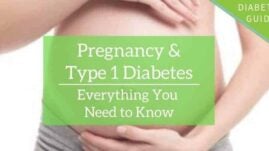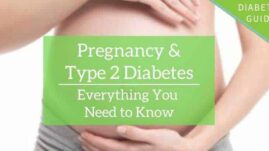Gestational diabetes is a common condition. Up to 9% of all pregnant women in the United States experience gestational diabetes.
While management can be difficult, it is a treatable condition. Most women go on to have healthy labor and deliveries even after diagnosis.
This article will investigate gestational diabetes and what happens after you give birth.

Table of Contents
- What is gestational diabetes?
- What causes gestational diabetes?
- What are the risk factors for gestational diabetes?
- What are the symptoms of gestational diabetes?
- Does gestational diabetes go away after giving birth?
- If I had gestational diabetes with my first pregnancy, will I get it again with my second?
- Will I get type 2 diabetes after having had gestational diabetes during pregnancy?
- I was diagnosed with type 1 diabetes after having gestational diabetes. Is there a connection?
- Does having gestational diabetes mean my child will get diabetes?
What is gestational diabetes?
Gestational diabetes is a form of diabetes that only affects pregnant women.
This condition occurs when your body cannot make enough insulin to manage blood sugar levels while you are pregnant.
It is only diagnosed in women who don’t already have diabetes.
In women who develop gestational diabetes, their blood sugar levels are higher-than-normal, often due to insulin resistance experienced during pregnancy.
Although it can alter your birth plan and make pregnancy a little more complicated, this relatively common condition has very manageable treatment options.
What causes gestational diabetes?
Gestational diabetes is caused by insulin resistance.
Most women experience insulin resistance during pregnancy. However, for women who were moderately insulin resistant before becoming pregnant, the added weight gain during pregnancy can increase insulin resistance to the point of a gestational diabetes diagnosis.
Gestational diabetes simply means that the body is not making enough insulin to healthily sustain both parent and the fetus in utero.
It is usually diagnosed towards the end of the second trimester and into the third trimester of pregnancy.
What are the risk factors for gestational diabetes?
The risk factors for developing gestational diabetes are similar to the risk factors for developing type 2 diabetes.
The risk factors for gestational diabetes include:
- A history of gestational diabetes in a previous pregnancy
- Being overweight or obese
- Being older than 25 years old at the time of pregnancy
- Having a family history of type 2 diabetes
- Having previously given birth to a baby who weighed more than 9 pounds
- Having polycystic ovary syndrome (PCOS)
- Are African American, Hispanic or Latino American, American Indian, Alaska Native, Native Hawaiian, or Pacific Islander
What are the symptoms of gestational diabetes?
Oftentimes gestational diabetes does not have any symptoms.
It is crucial to take the glucose tolerance test given to you by your doctor. This is used to diagnose gestational diabetes.
However, you may experience the following symptoms:
- Extreme thirst and dry mouth
- Frequent urination
- Blurry/changes to vision
- Headache
- Body ache
- Fruity-smelling breath
- Unintentional weight loss
- Fatigue or lethargy
- Nausea or vomiting
- Increased appetite
- Slow-healing wounds
- Yeast infections
Does gestational diabetes go away after giving birth?
Gestational describes the time between conception and birth. Once you give birth, gestational diabetes will go away.
Immediately upon giving birth, insulin resistance goes back down to normal in most cases.
People who have been prescribed insulin and were told to closely monitor blood sugar levels can stop doing so, under the guidance of their doctor.
Additionally, most dietary changes may be dropped.
However, having gestational diabetes does increase your risk of developing type 2 diabetes later on in life.
According to the Centers for Disease Control and Prevention (CDC), about 50% of people who have had gestational diabetes go on to develop type 2 diabetes later on in life (within five years.)
In fact, having gestational diabetes is one of the strongest risk factors for developing type 2 diabetes.
Your doctor will probably want you to monitor your diet and exercise routine.
Depending on your risk, you’ll be tested for diabetes at your regular appointments. Your doctor may also advise you to keep an eye out for diabetes symptoms.
Most babies born to women with gestational diabetes suffer no birth complications (both short and long-term.)
However, if you have had gestational diabetes, your child is more likely to develop obesity as a child and teen. Their risk for developing type 2 diabetes later in life is increased as well.
If I had gestational diabetes with my first pregnancy, will I get it again with my second?
Having previously had gestational diabetes in an earlier pregnancy is a major risk factor for developing gestational diabetes during pregnancy again.
However, developing it again is not a guarantee.
There are strategies you can enlist to help prevent the onset of insulin resistance and gestational diabetes, including:
- Losing excess weight if you’re overweight or maintaining a healthy body weight.
- Eating a healthy diet with limited processed foods and added sugars.
- Increasing your daily physical activity.
- Drinking plenty of water.
- Getting between 7-9 hours of sleep per night.
- Managing stress with breathing exercises, meditation, and yoga.
Will I get type 2 diabetes after having had gestational diabetes during pregnancy?
Studies show that around 50% of people who have had gestational diabetes go on to develop type 2 diabetes within five years, but it is not a guarantee.
Maintaining a healthy body weight and getting regular physical activity can help prevent or delay the onset of type 2 diabetes.
Talk with your doctor if you’re interested in learning more about strategies to delay and prevent the development of type 2 diabetes.
I was diagnosed with type 1 diabetes after having gestational diabetes. Is there a connection?
People who have had gestational diabetes are more likely to also be diagnosed with type 1 diabetes in the postpartum period if they test positive for pancreatic beta-cell autoantibodies.
This is much rarer than being diagnosed with type 2 diabetes postpartum.
Sometimes the hormonal changes during pregnancy can actually trigger type 1 diabetes which is mistakenly diagnosed as gestational diabetes.
A proper diagnosis is usually made after labor and delivery.
Does having gestational diabetes mean my child will get diabetes?
When the parent has gestational diabetes, it increases their child’s odds of developing both obesity and type 2 diabetes later on in life.
Studies have shown that gestational diabetes is associated with diabetes in offspring from birth to 22 years old. However, after 22 years of age, the risk factor goes away.
Many offspring of people who had gestational diabetes during pregnancy do not go on to develop obesity or type 2 diabetes later on in life.
However, since it is a risk factor for both, the child’s pediatrician may want to keep a close watch for diabetes symptoms until the age of 22.


